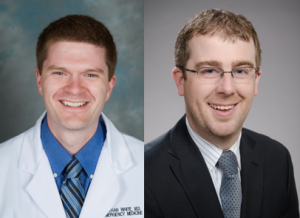DEM Researchers Partner with UW Bioengineering to Develop Clinical Risk AI Tools
 Drs. Utarnachitt, McCoy, Sayre, and White are co-authors on a study published in the journal Nature Biomedical Engineering titled “A cost-aware framework for the development of AI models for healthcare applications.” In partnership with Gabriel Erion, Joseph D. Janizek, and Su-In Lee from the UW School of Computer Science and Engineering as well as Dr. Carly Hudelson from UW GIM, this study explores cost-aware AI (CoAI) framework for the development of predictive models that optimize the trade-off between prediction performance and feature cost in financial resource limited settings such as emergency and critical care medicine.
Drs. Utarnachitt, McCoy, Sayre, and White are co-authors on a study published in the journal Nature Biomedical Engineering titled “A cost-aware framework for the development of AI models for healthcare applications.” In partnership with Gabriel Erion, Joseph D. Janizek, and Su-In Lee from the UW School of Computer Science and Engineering as well as Dr. Carly Hudelson from UW GIM, this study explores cost-aware AI (CoAI) framework for the development of predictive models that optimize the trade-off between prediction performance and feature cost in financial resource limited settings such as emergency and critical care medicine.
Although clinical risk scores have a long history in medicine, recent years have seen an upsurge in the exploration of AI techniques, specifically machine learning, to make these clinical predictions. The models show that using AI to make clinical predictions is easier and faster than traditional techniques, and is especially valuable in settings where the provider’s time and attention are in high demand such as emergency departments and intensive care units. In this study, the authors aim to bring this technology to settings such as EDs and ICUs at a more affordable price, attempting to bridge the gap between performance and cost.
In their research, they found that relative to clinical risk scores, CoAI substantially reduces the cost and improves the accuracy of predicting acute traumatic coagulopathy in a pre-hospital setting, mortality in intensive-care patients and mortality in outpatient settings.
The researchers also found, and outline in their paper, that CoAI outperforms state-of-the-art cost-aware prediction strategies in terms of predictive performance, model cost, training time and robustness.
 This collaboration between two historically disparate fields is essential for the continued development of effective AI tools for biomedical research and clinical decision-making.
This collaboration between two historically disparate fields is essential for the continued development of effective AI tools for biomedical research and clinical decision-making.
For more information about this study, please see the article titled “With CoAI, UW researchers demonstrate how predictive AI can benefit patient care — even on a budget” on the Paul G. Allen School of Computer Science and Engineering website. The study’s full text is posted on online.







